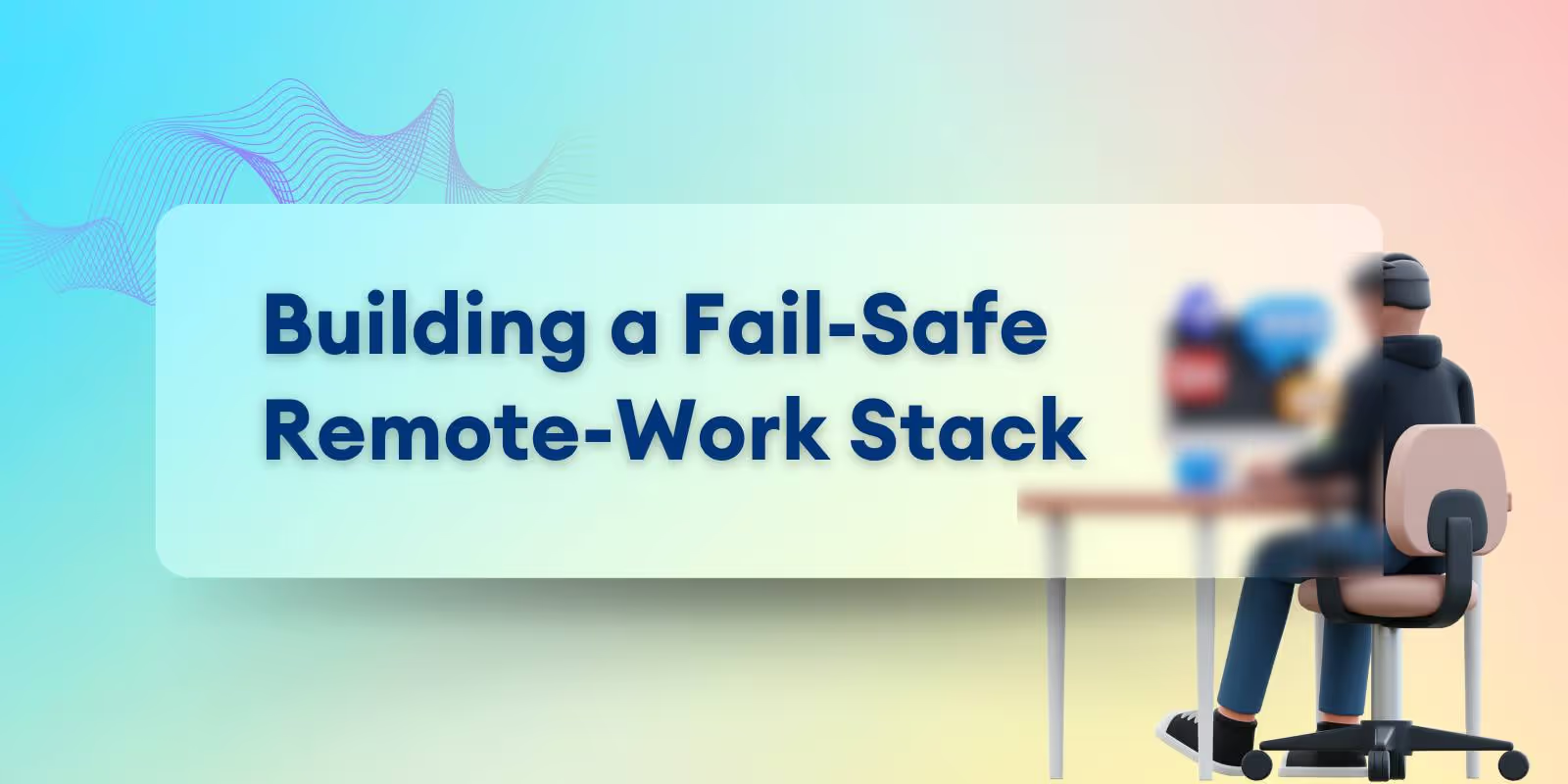
You're on the video call of your life; pitching a big client, about to close the deal.
Then suddenly, your internet drops. The screen freezes. The call ends.
Panic hits.
When you're a solopreneur running lean, these moments aren't just stressful; they're financially and reputationally painful. Every second offline costs credibility, cash, and customer trust.
But here's the good news: building an affordable, always-on remote-work stack is simpler and cheaper than you think.
This article walks you step-by-step through creating a bulletproof digital infrastructure, complete with reliable apps, smart internet redundancy, power backups, and simple tests that keep your business running smoothly, no matter what.
Why Always-On Matters for Remote Solopreneurs
The Real Cost of Downtime
Sixty minutes offline might seem minor until you measure the true damage.
Consider a scenario: you’re mid-launch, promoting a time-sensitive offer, and your internet drops. Leads can’t sign up, clients miss critical updates, and suddenly your credibility is on the line.
Research shows even short outages can cost small businesses hundreds or thousands in lost revenue.
But it goes beyond money. Downtime chips away at client trust and dents your brand's reliability; qualities that solopreneurs depend on heavily. Your hard-earned reputation can evaporate faster than your Wi-Fi signal, leaving lasting consequences long after the connection returns.
When you're a one-person team, the impact multiplies: there's no IT department, no immediate backup, just frustrated clients and missed opportunities. Every interruption sets you back further, forcing you to waste time and energy rebuilding lost momentum.
Investing in redundancy isn’t an expense; it's a strategic decision that safeguards your profits, preserves your brand reputation, and ensures your business thrives, even when technology lets you down.
Set Up a Secondary Internet Line
One simple solution dramatically reduces the risk of downtime: setting up a secondary internet line. This doesn’t mean doubling your costs or adding complexity, just a strategic backup that activates seamlessly when your main line falters.
Smart founders make it a habit to compare local internet providers that specialise in business-grade connectivity, offering clear uptime guarantees and responsive support tailored for remote entrepreneurs. Don’t settle for residential plans with murky service agreements. Instead, look closely at service-level agreements (SLAs):
How quickly will support respond if your main connection drops?
Will the secondary line automatically take over without manual intervention?
Prioritise providers who understand your business depends on constant connectivity, not just browsing speed. Even a basic business-grade backup can reduce outages from hours to mere seconds, providing uninterrupted video calls, smooth sales launches, and reliable daily workflows.
Spending a little extra time comparing providers now will save you significant stress, money, and client relationships later.
Core No-Code Apps for Seamless Remote Work
Project Management & Collaboration
Solopreneurs don’t have time for clunky workflows, especially when working remotely. Lean, no-code apps make project management effortless and reliable.
Tools like Airtable let you organise tasks, track deadlines, and automate reminders without a single line of code.
Need more visual planning? ClickUp provides intuitive boards, calendars, and checklists that keep you on schedule and prepared.
For versatile organisation and seamless collaboration, Notion is a solopreneur favourite; combining notes, tasks, and projects into one minimalist interface.
These platforms aren’t just convenient; they drastically reduce the chaos when connectivity is shaky or when urgent tasks pile up.
The best part: these no-code tools sync instantly across devices, ensuring you always have real-time visibility into your business operations. Even better, their offline modes ensure no data gets lost when your internet blinks.
With these tools in your stack, you can maintain productivity and deliver on client expectations, whether you're online, offline, or switching between the two.
Bulletproof Document & File Storage
Reliable document storage is mission-critical for remote solopreneurs. Losing a key file minutes before a client meeting is the kind of nightmare scenario no founder can afford.
Lean solutions like Google Drive and Dropbox offer secure, automatic cloud syncing and easy version control, ensuring you never lose another proposal, contract, or crucial deliverable.
But just uploading files isn’t enough. Activate automatic offline-sync settings to ensure key documents stay accessible, even if your internet fails unexpectedly. Schedule weekly or monthly backups to a physical hard drive as an extra layer of redundancy. This simple step provides peace of mind, guaranteeing immediate access to essential files regardless of your connection status. It’s an easy, affordable way to protect your work and reputation.
With a proper file-management workflow in place, you'll never waste time chasing missing files or apologising to clients for avoidable delays again. It’s not flashy, but bulletproof file storage is foundational for sustainable remote operations.
Internet Redundancy: Simple, Reliable Backup Plans
Residential vs. Business-Class Main Connection
At first glance, residential internet plans seem attractive - lower prices and blazing speeds. But speed alone won’t save your client's presentation if the connection suddenly drops.
Residential services offer limited support and vague uptime guarantees, leaving you stuck waiting hours or days for restoration. Business-class connections, while slightly pricier, provide clear service-level agreements (SLAs), guaranteed uptime percentages, and rapid-response tech support tailored specifically to entrepreneurs and small businesses. Providers typically promise restoration within hours, not days, and even compensate you if downtime extends beyond their guaranteed window.
For solopreneurs whose livelihoods depend heavily on stable connectivity, the modest price increase pays dividends in reliability and peace of mind. Invest upfront in business-grade service to avoid frantic midnight calls to unresponsive customer support. When your online presence directly translates into revenue, investing in reliability isn’t just smart, it’s essential.
Automatic Failover Routers
Setting up an automatic failover is simpler and more affordable than it sounds. Failover routers, like budget-friendly options from TP-Link or Ubiquiti, automatically switch your internet connection from your primary line to your secondary line when they detect an outage, no manual intervention required.
For roughly the cost of a single lost client, you can purchase a failover router that activates seamlessly within seconds, keeping video calls running smoothly and emails flowing without interruption. Installation involves connecting your primary and backup internet lines directly into the router and following a straightforward online setup wizard.
From there, automatic failover happens silently and instantly. Every solopreneur should test their failover setup monthly: temporarily unplug your main line and verify your backup kicks in immediately.
Doing this regularly means you’ll confidently weather real outages when they happen, protecting your professional image, client relationships, and revenue stream without needing expensive tech support or complicated equipment.
Power Backup: When Electricity Fails
Even the best internet redundancy setup is useless without electricity. Thankfully, protecting your gear from power outages is surprisingly affordable. Invest in a basic Uninterruptible Power Supply (UPS) to keep your router and modem running for at least two extra hours during blackouts, usually under $100.
Portable battery packs for your laptop, priced around $50-$150, ensure your workflow remains uninterrupted, regardless of local power issues. When choosing, look for packs rated above 20,000mAh to cover a full day's work. Plug essential devices into your UPS and routinely test battery life every three months by briefly unplugging from mains power.
These simple, low-cost safeguards mean you’ll never lose critical progress on a document or get disconnected mid-call again, preserving your productivity and peace of mind.
If blackouts are frequent, consider eco-conscious solutions like portable solar chargers. Compact panels under $200 can recharge your essential devices fully in a day of moderate sun. Perfect for remote areas or eco-minded solopreneurs, solar chargers reduce dependence on the grid, keeping your setup operational without ongoing costs.
While solar alone may not fully replace traditional backups, it provides a reliable and environmentally-friendly complement, further protecting your operations from disruptions.
Regular Testing & Confidence Checks
The only thing worse than no backup solution is one that doesn't work when you need it.
Schedule simple monthly tests: briefly unplug your main internet connection to verify automatic failover activates instantly. Check your mobile hotspot's connectivity speed and battery health regularly. Ensure your battery packs and UPS units power your gear without interruption by temporarily disconnecting from the mains supply.
Here’s why it matters: Without regular checks, a small oversight could turn into a costly embarrassment. Consistent testing boosts your confidence, eliminates uncertainty, and guarantees that when real downtime strikes, your backups perform exactly as intended, preserving your reputation and bottom line.
Conclusion
Downtime doesn’t just cost time, it costs trust, money, and momentum. But with the right tools and a little foresight, solopreneurs can build lean, reliable systems that stay online even when everything else goes sideways. From no-code apps and automatic failovers to budget-friendly routers and mobile hotspots, creating an always-on ops stack isn’t optional, it’s smart business.
Start with a secondary connection, test your setup monthly, and protect your power supply.
Want to go deeper? Check out our full guide to Mastering Remote Work for more workflows, tools, and systems built for solo founders who can’t afford to go dark.


.jpg)

